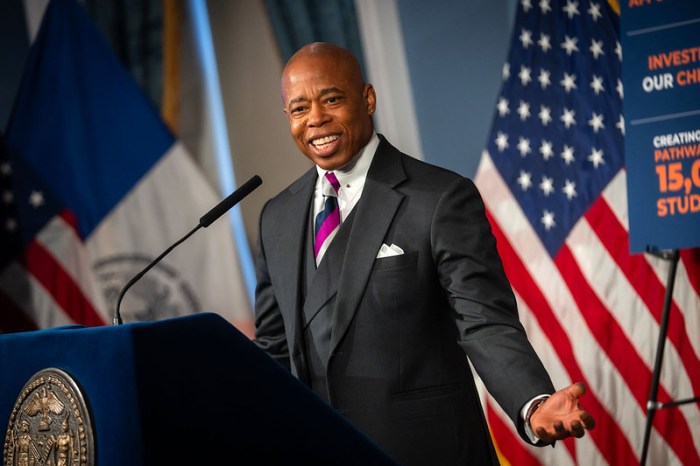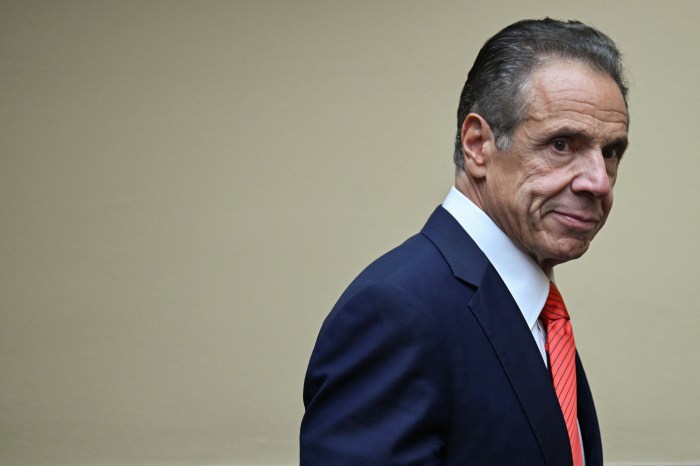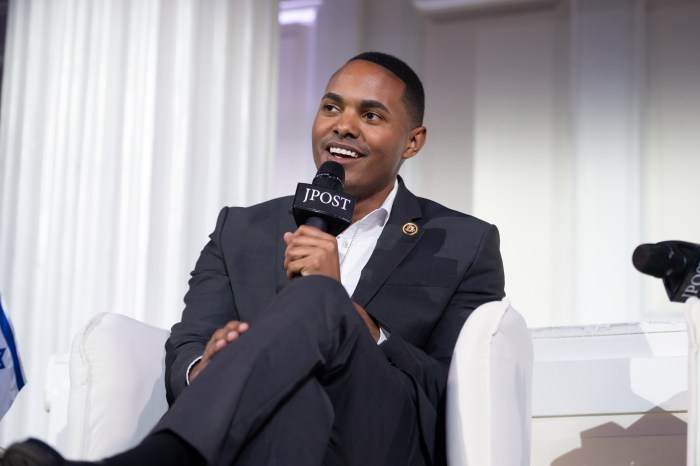
New York Assemb. Nicole Malliotakis is little known outside of her district, but she knows how to make a stir that’s resonating among New York City voters looking for a candidate who will stand up to Mayor Bill de Blasio.
As Malliotakis heads into the general election in November, on track to become the second woman in city history to run for mayor as a Republican, she’s using her wit and unapologetic appraisal of de Blasio to win over New Yorkers, experts say.
Likability is key to Malliotakis’ campaign, especially in a political world that’s largely made up of men, according to Erin Vilardi, founder of VoteRunLead, a nonprofit that empowers women to run for elected offices.
Unlike men, who can run on confidence and respect alone, likability is a “non-negotiable quality voters seek in women officeholders and candidates,” according to a 2016 study by the Barbara Lee Family Foundation.
“Women have a double bind of being both likable and respected,” Vilardi said. “Likability and respect go hand in hand.”
VoteRunLead teaches that humor can be used as a tool to bridge the divide between the two, Vilardi said.
Malliotakis will have to balance toughness with humor, which she’s already doing well, Vilardi added, pointing to the assemblywoman’s recent news conference during which she offered de Blasio a Red Bull following reports that he took naps on the job.
“To me, it’s a smart move,” Vilardi said, because it gets Republicans talking about her. “I actually think it’s a strategy for her and she’s using every opportunity to raise that strategy.”
Taking de Blasio to task in unique ways will also garner Malliotakis the media attention she needs, Vilardi said, like adding a clock to her website that counts the number of days it’s been since the mayor promised to release a list of campaign donors who didn’t get political favors they sought.
And while it’s rare for a new candidate to overcome an incumbent mayor, Malliotakis is also playing a longer game, running now so that she can say she was the only one to stand up to de Blasio in the previous election, according to Vilardi.
“She’s actually running for 2021, in my opinion,” she said. “Women are more likely to win an open race than one with an incumbent, research shows.”
Malliotakis became the presumptive Republican candidate after rival Paul Massey dropped out of the race in late June. She heads into Primary Day unopposed on the Republican ticket, and if elected mayor, she would be the first woman in the city to hold that office.
“Women in government need to be tough because it is very much a man’s world,” Malliotakis said in an email. “But if you are too tough you get labeled a ‘witch’ like Hillary Clinton was and if you are too soft, you get labeled ‘airhead’ like Sarah Palin was.”
Her unrelenting critiques of de Blasio have been a good strategy so far, but it’s a tactic that will not play as well after Primary Day, according to George Artz, a democratic consultant and former press secretary to former Mayor Ed Koch.
“I would not do it when the race heats up … it’s not mayoral,” he said.
Malliotakis’ debating skills have helped her, Artz noted, though the real test will be how she fares against de Blasio. Debates for the general election will take place on Oct. 10 and Nov. 1.
“Let’s see what she does against a mayor who’s a very glib guy and a tough debater,” Artz said.
Her performance was strong during a debate with Massey in late June.
“She did extremely well. She had the room in her palm,” said Artz, who was in attendance. “… Massey was not good, and he dropped out right after that.”
In particular, Malliotakis showed how knowledgeable she is on the city’s property tax system and transit infrastructure, according to Greg David, who moderated the Crain’s debate.
Debates are extremely important in the fight to sway voters, Artz added.
“I remember the Koch-Cuomo gubernatorial debate in 1982, and Cuomo did extremely well against Koch and that gave him the momentum to go on and win the gubernatorial election,” he recalled.
Former City Council Speaker Christine Quinn, however, did not do well in her first debate against de Blasio during her failed bid for the Democratic mayoral nomination in 2013, according to Artz.
“Quinn was a little bit afraid and held back during her debates,” he said. “And I think Malliotakis is all out there and probably a better debater. I think in many ways, she’s probably a better public speaker than Quinn.”
Unlike Quinn, who lost her seat in the City Council, Malliotakis has little to lose by not holding back, he added.
Although Malliotakis won her first battle in becoming the presumptive GOP candidate, she still has a long way to go in taking on de Blasio in the general election.
A Quinnipiac Poll in late July gave de Blasio a 57-22 percent lead over Malliotakis. Twenty-one percent said they would vote for someone else or didn’t plan to vote. Of those polled, 78 percent said they didn’t know enough about the Staten Island lawmaker to form an opinion on her candidacy.
“Malliotakis has an identification problem. She’s obviously well known in Staten Island, but that’s a very small part of the electorate,” Artz said. “She needs to show up in the other boroughs and areas where there are disaffected people.”
Malliotakis, whose Assembly district covers parts of Staten Island and southern Brooklyn, was relatively unknown in city politics prior to entering the race for mayor. She was elected to the Assembly in November 2010 after defeating a two-term incumbent, former Democratic Assemb. Janele Hyer-Spencer.
Born to immigrant parents from Greece and Cuba, Malliotakis has said she believes she can sway disaffected Democrats away from de Blasio with the help of her upbringing, particularly since she is proficient in Spanish.
“She’s talking to the Spanish community in Staten Island but she needs to do that in other boroughs,” Vilardi said. “It’s not really clear that she’s doing this in other boroughs.”
Now is the time to shift toward making a case on why swing voters should choose her over de Blasio, she added.
“She’s done a good job of differentiating herself from de Blasio, but she has to start making the case of ‘why her?’ ” Vilardi said. “… Voters want to know what you’re going to bring to the table.”
Malliotakis has vowed to focus on capping city spending, enforcing quality-of-life laws and improving transit and traffic infrastructure, if she’s elected. In addition to her recent proposal on a municipal hiring freeze that would help fund repairs for the subway system, she has also taken a public stance on so-called “sanctuary cities.” (She’s pro, but differs from her opponent on specifics.) Her campaign website outlines broader ideals on a variety of topics ranging from jobs and education to homelessness and animal rights.
“Obviously I am at a disadvantage in getting my message out because the mayor has raised so much more money than I have,” Malliotakis said. So far, Malliotakis has spent about $194,396 on her campaign, according to the New York City Campaign Finance Board. By comparison, de Blasio has spent roughly $2.2 million on this election cycle alone, per the CFB.
Ultimately, the gender disparity in city politics could be an opportunity for Malliotakis.
“Women have been doing behind-the-scenes work for too long. It’s time for women to be in the front row,” Vilardi said. “I think she should do more of that. People have no idea that there are only 13 women on the City Council.”
But while running for mayor as a woman Republican could offer Malliotakis a bump in visibility, she will need to bring more to the table when it comes to the issues.
“I don’t think people vote for gender. I think they vote for the best candidate and the candidate they like,” Artz said. “You win on the merits.”

































